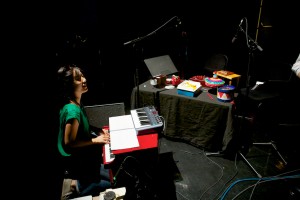 United States Mostly Mozart (8): Phyllis Chen, Carla Kihlstedt: Phyllis Chen (piano and toy piano), Carla Kihlstedt (vocals and violin), International Contemporary Ensemble, Clark Studio, Lincoln Center, New York City. 17.8.2013 (DS)
United States Mostly Mozart (8): Phyllis Chen, Carla Kihlstedt: Phyllis Chen (piano and toy piano), Carla Kihlstedt (vocals and violin), International Contemporary Ensemble, Clark Studio, Lincoln Center, New York City. 17.8.2013 (DS)
Phyllis Chen: Hush (2011)
Phyllis Chen: Archipelago (2013, world premiere)
Phyllis Chen and Robert James Dietz: Mobius (2011)
Phyllis Chen: Everything Turns Everything Revolves (2013)
Carla Kihlstedt: At Night We Walk in Circles and Are Consumed by Fire (2012)
Factual Boy
Rocks and Concrete
The Impossible Dance
Against Dreaming
Addressing a Dream
Gaest
Phyllis Chen, toy piano virtuoso, has put the “play” back in “playing music,” but not without the complex thoughtfulness that make her compositions succinct, touching, and pleasurably innovative. Featured at one of ICE’s ten Mostly Mozart Festival performances, the composer makes prevalent use of music boxes, various plastic toddler toys (such as a Fisher Price record player), and a shiny bright red toy piano (seductive to even the most grown of grown-ups), all evoking a kind of subtle homage to the child Mozart. Even if the master were perhaps low on toys, he composed as king of his own playground—the adult-sized piano.

Chen’s eclectic use of odd instruments makes her pieces as visually stimulating as they are aurally. In the mesmerizing Mobius, two music boxes with one long blank strip of paper connected both in said-mobius twist. While two ICE members held the boxes to crank the tiny handles that would move the paper steadily through, Chen took a whole puncher and “wrote” the piece right before our eyes. Robert James Deitz, seated next to them at a laptop, was electronically connected to these two mechanisms and manipulated the sounds in loops and through various harmonic displacements. The result was a meditative activity that drew in the listener with visceral clicking sounds made by the puncher, intertwined with the electronic re-creations emanating softly from nearby speakers.
Emphasizing the visual, an ensemble of plastic toys (and that bright red toy piano) made up the instrumentation to Chen’s score, written to accompany the 1929 experimental film Everything Turns Everything Revolves by Dada artist, Hans Richter. From choppy street scenes to close-ups of tantalizing circus acts, Chen’s music was perfectly suited to the film, making it seem like the two had been created simultaneously. And just as Richter was capturing everyday life through the new visual possibilities of film, Chen approached sound through a completely unorthodox set of instruments. Not only did the aural fit the visual, but the concepts also held together powerfully.
In all the works, including the three-minute Archipelago for mandolin and two toy pianos, (which experiments with the unexpectedly well-matched timbres of the two instruments), a perfect balancing act is achieved between high art and kitsch creation. Neither is elevated above the other, but both angles provide insight into the work and inform a rich sonic fabric that can be listened to casually or examined systematically.
Chen, however, is also an exceptional concert pianist, and in the second half of the performance she joined other ICE members as the back-up ensemble performing with singer/violinist Carla Kihlstedt. Kihlstedt also approaches music with a characteristic playfulness, singing as she bows her violin and breaking down any preconceived barriers between classical and rock composition. At Night We Walk in Circles and Are Consumed by Fire is based on dreams submitted by various ICE members and takes us into a cycle of the subconscious—one animated song after another, each distinct in character and gripping in its melodic and rhythmic landscape.
Since the work is an ongoing ICElab project, Kihlstedt also invites audience members to take part in the fun. If you would like to submit any of your noteworthy dreams for consideration for this song cycle, she invites you to compose an email to ICE (www.iceorg.org).
Daniele Sahr